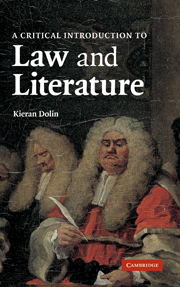Book contents
- Frontmatter
- Contents
- Preface
- Introduction to law and literature: walking the boundary with Robert Frost and the Supreme Court
- PART I EMINENT DOMAINS: THE TEXT OF THE LAW AND THE LAW OF THE TEXT
- PART II LAW AND LITERATURE IN HISTORY
- 3 Renaissance humanism and the new culture of contract
- 4 Crime and punishment in the eighteenth century
- 5 The woman question in Victorian England
- 6 The common law and the ache of modernism
- 7 Rumpole in Africa: law and literature in post-colonial society
- 8 Race and representation in contemporary America
- Conclusion
- Notes
- Bibliography
- Index
8 - Race and representation in contemporary America
Published online by Cambridge University Press: 05 June 2012
- Frontmatter
- Contents
- Preface
- Introduction to law and literature: walking the boundary with Robert Frost and the Supreme Court
- PART I EMINENT DOMAINS: THE TEXT OF THE LAW AND THE LAW OF THE TEXT
- PART II LAW AND LITERATURE IN HISTORY
- 3 Renaissance humanism and the new culture of contract
- 4 Crime and punishment in the eighteenth century
- 5 The woman question in Victorian England
- 6 The common law and the ache of modernism
- 7 Rumpole in Africa: law and literature in post-colonial society
- 8 Race and representation in contemporary America
- Conclusion
- Notes
- Bibliography
- Index
Summary
I want to end this historical overview of relations between law and literature by focusing on the United States of America in the mid- to late twentieth century. It was here that ‘Law and Literature’ emerged as a field of study, and that the conscious dialogue between lawyers, writers and critics began to take place across the wall erected in modernity by both disciplines. The ensuing conversation has ramified into the many debates discussed in this book (and others), and has sponsored new knowledges capable of transforming the practice of law and the humanities.
As a movement combining theoretical analysis and practical application, Law and Literature has had a particular commitment to equal justice in American society. What Brook Thomas calls ‘literature's ability to produce alternative narratives to the dominant ones of a culture’ has made Law and Literature the site of an invaluable critique of the stories and ideologies upheld by America's legal system. As a result, the law's treatment of women, people of colour, the disabled, children and many other marginalised groups has been an integral concern of this interdisciplinary field. Yet this respect for minority rights has been sustained not only by the possibilities of literature, but by a cultural commitment enshrined in the law. The nation's basic legal framework includes the Fourteenth Amendment to the Constitution:
All persons born or naturalised in the United States, and subject to the jurisdiction thereof, are citizens of the United States and the State in which they reside. No State shall make or enforce any law which shall abridge the privileges or immunities of citizens of the United States; nor shall any State deprive any person of life, liberty or property without due process of law; nor deny to any person within its jurisdiction the equal protection of the laws.
- Type
- Chapter
- Information
- A Critical Introduction to Law and Literature , pp. 182 - 206Publisher: Cambridge University PressPrint publication year: 2007
- 1
- Cited by



